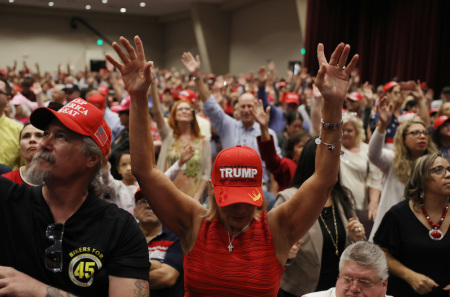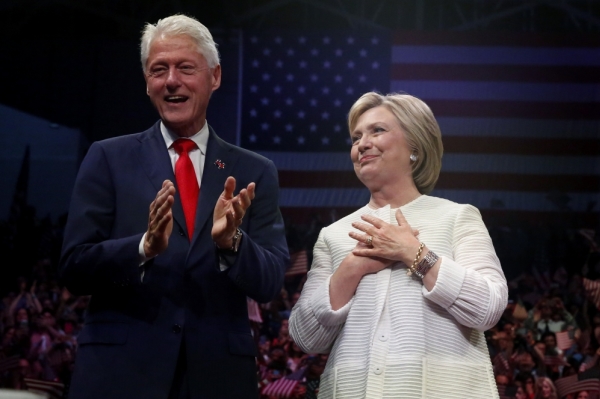Trump's favorability among white Christians in battleground states falls 27% since March: poll

President Trump’s favorability among white Christians in battleground states has dropped by 27 percentage points since mid-March as the country has dealt with the effects of the coronavirus pandemic, according to data released by the Public Religion Research Institute.
PRRI, a nonprofit polling firm that researches the intersection of religion, culture and public policy, released a new survey Thursday of 1,008 Americans conducted from April 21 to April 26.
The survey found that since March, the percentage of white Christians in presidential battleground states who say they hold a mostly or very favorable view of the president has dropped from 75% to 48%.
According to PRRI, the decline puts the president’s favorability among White Christians in those states “more in line” with the demographic’s view of him recorded in 2019 (55%).
Trump's favorability among respondents from battleground states fell from 53% in March to 38% in April.
Among all Americans surveyed, only 43% said they hold a mostly or very favorable view of Trump. Meanwhile, 54% of respondents said they hold a mostly or very unfavorable view of him.
The survey shows that Trump’s favorability rating dropped 7 percentage points over the last four weeks when it was at 49%. The March result equated to the highest favorability rating for Trump since 2015 and marked the first time in PRRI’s polling that Americans were more likely to say they hold a favorable view of than an unfavorable view (46%) of Trump.
“Trump benefited from a brief ‘rally around the flag’ effect as the coronavirus pandemic began to spread in the U.S. But over the last four weeks — as the total number of reported U.S. cases of the coronavirus increased exponentially from around 33,000 cases to more than 900,000 cases — this boost has rapidly dissipated,” a PRRI analysis of the new data reads.
“Trump’s current favorability rating (43%) is similar to the 40% of Americans who held favorable views of him in February shortly after he was acquitted of impeachment charges, and the 41% of Americans who held favorable views of him between March and December 2019.”
When broken down by religious affiliation, the PRRI data shows that Trump’s favorability among white evangelical Protestants declined 11 percentage points since March to 66% in April.
Among white mainline Protestants, Trump’s favorability rate declined from 62% to 44%. The favorability rate among white Catholics declined from 60% to 48%. As for non-white Protestants, PRRI found no significant change as the favorability rate dropped from 40% in March to 36% in April.
In the 2016 presidential election, Trump’s victory over Democrat Hillary Clinton relied heavily on the support of Christians. According to exit polls, 58% of respondents who identified as “Christian or Protestant” said they voted for the real estate mogul in 2016. Meanwhile, 52% of Catholics and 81% of white evangelical or born-again Christians said the same.
PRRI also found no significant change in Trump’s favorability rate among religiously unaffiliated Americans (37%). The demographic’s “numbers have not changed notably since 2019.” In 2016, exit polls indicated that about 26% of people who identified their religion as “none” said they voted for Trump.
The survey, which contains an error margin of +/- 3.5 percentage points, suggests a divide among white Christians based on those living in counties below or above the median number of novel coronavirus cases.
According to the data, white Christians in counties less impacted by COVID-19 are more likely (63% to 50%) than those living in counties more affected by the virus to say they have a favorable view of the president. According to PRRI, there is “no such difference among other religious groups.”
In total, the study suggests that people of all demographics in counties hit hardest by coronavirus are 10% less likely to have a favorable view of the president.
About half (49%) of respondents living in areas of Republican-leaning states with higher numbers of coronavirus cases per capita say they view Trump favorably.
By comparison, only 40% of respondents living in areas of Democrat-leaning states with higher numbers of COVID-19 cases and 36% of respondents living in areas of battleground states hit hard by the virus said they hold a favorable view of Trump.
“For all three types of states, Trump’s favorability in these counties with higher counts of COVID-19 cases closely resembles his favorability overall,” the analysis reads.
Follow Samuel Smith on Twitter: @IamSamSmith
or Facebook: SamuelSmithCP





















